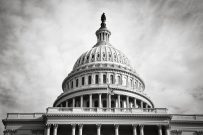The Senator from Harvard has no conception of the proper judicial role other than that it should favor litigants whose political stances she supports.
Silencing Warren
Among the current body of U.S. Senators, Elizabeth Warren (D-Mass.) is certainly the intellectual favorite of many liberals in the country, and she is already being spoken of as a potential Democratic presidential candidate in 2020. The former Harvard law school professor and consumer protection advocate has a great command of the issues, but her ideological commitments undermine her abilities, making her less effective as a legislator, and an often insufficiently decorous member of the U.S. Senate. Now that she has become a cause célèbre in the matter of Senator Jeff Sessions’ nomination to be Attorney General, the rebukes she is receiving from Republicans will come back to haunt them.
President Trump has described her personage and ideas as “goofy,” and now comes the Senate Majority Leader, Senator McConnell (R-Ky.), to censor her for “impugn[ing] the motives and conduct of our colleague from Alabama.” Amidst the debate over Senator Sessions’ fitness to be our next Attorney General, Senate Democrats have held two consecutive late night sessions to express their opposition to him.
Senator Warren took the opportunity to read aloud from a letter written in 1986 by Coretta Scott King, which criticized then-U.S. Attorney Sessions (who was at the time being considered for a federal judgeship). Majority Leader McConnell called her to order in mid-speech, citing Senate Rule 19, and asked the presiding officer, Senator Steve Daines (R-Montana), for a ruling. Senator Daines called for a vote, and when a majority held her to be in violation of the rule, she was told to take her seat.
Was Senator Warren’s speech appropriate and germane to the debate over the appointment of Senator Sessions? Or was Senator Warren simply advancing her personal political agenda and attempting to undermine the President’s efforts to create a cabinet? Such questions will continue to be debated. Unfortunately, Senator McConnell’s actions, while understandable, were wrongheaded, and in making such a blatant attack on the Senate’s leading progressive intellectual, McConnell encouraged more hostility generally, and the continued wrath of Senator Warren, specifically (and she has been making the rounds with sympathetic television interviewers ever since).
Senator McConnell should have allowed Warren to speak at her heart’s content, which is more in the spirit of the U.S. Senate than invoking Rule 19 when you disagree with a fellow senator’s assessment of a candidate for confirmation. Unlike being elected to the U.S. House, on the day you are sworn in as a member of the U.S. Senate, you are an equal in most regards to your colleagues. You also accept the normative rules of decency and openness, and allow your colleagues to discuss and debate with few limitations. Sadly, McConnell ignored the historical ethos of the Senate and the political implications of stifling debate in shutting down Senator Warren.
The past proves open and free debate is the best course of action for senators to follow in most instances. As Vice-President of the U.S. and President of the Senate, Thomas Jefferson penned the original rules for the U.S. Senate, and Senate proceedings have been amazingly orderly and congenial for the most part. Of course, skirmishes have taken place over the years, but the example set by Vice-President John C. Calhoun in handling one of the most important cases of a controversial Senate speech should inform our current understanding.
The incident began on rather innocuous terms on March 30, 1825, when Calhoun refused to preserve “order” and interrupt Senator John Randolph’s (Virginia) speech against President Adams and Secretary of State Clay, with whom Randolph had recently dueled. An incident occurred between Senator Randolph and Senator Mahlon Dickerson (New Jersey), and Calhoun refused to limit Randolph’s speech, a power supposedly provided by the presiding officer’s “power of preservation.” Calhoun argued that the Senate President held “appellate power” as the beneficiary of the Senate’s trust; such responsibility did not primarily dictate that the Senate President preside over legislative sessions. In other words his official job description did not require him to be a referee, therefore Calhoun could let people freely deliberate among themselves without being liable to any charge of dereliction of his duty. The cry for silencing Randolph ended fairly quickly and without a major event. Even Senator Dickerson approved of Calhoun’s effort to encourage a fullness of debate. Because of the initial freedom of discussion, a profound, yet neglected exchange on the power of the executive in republican government ensued (“Patrick Henry-Onslow” debate).
Most importantly, the legislative process and decision-making resumed without delay after allowing for the greatest freedom of expression. By allowing Randolph to speak without interruption, the Senate continued to function and debate the legislative priorities of the country. Again, openness and a full debate facilitated and encouraged the democratic process. Senator McConnell would do well to act in this spirit when the opportunity next avails itself.



